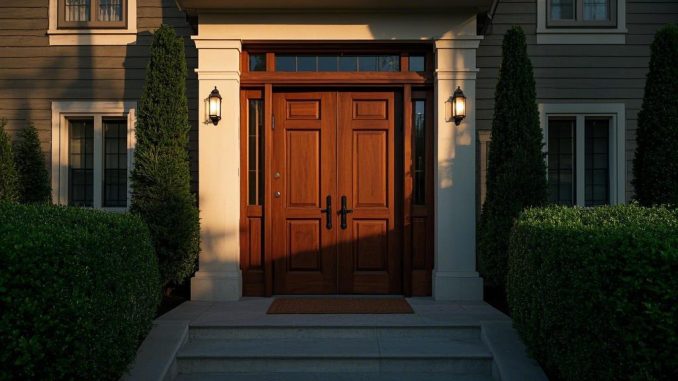
I. Introduction
In traditional Chinese culture, feng shui is a complex and profound system that believes in the existence of a special energy – “Qi”, which is fundamental in the operation of all things in the universe. In the home environment, the circulation of “Qi” is of utmost importance, and doors and windows, as the main channels connecting the inside and outside of the house, play a crucial role in terms of feng shui.

II. The Importance of Doors and Windows in Feng Shui
Doors and windows are not only related to indoor lighting, ventilation, and privacy in a scientific sense but also have a direct or indirect impact on the indoor feng shui. In feng shui theory, they are the primary means of absorbing and releasing the energy of heaven and earth within the home. The size, shape, location, and opening direction of doors and windows all influence the internal feng shui.
III. Feng Shui – related Aspects of Door and Window Selection
- Material Selection
- Wood doors are considered in traditional feng shui to be able to gather popularity and wealth. They have a warm and natural feel.

- Metal doors and windows symbolize toughness and perseverance, which makes them suitable for commercial places.

- Glass doors and windows in modern residences can introduce more natural light. However, attention needs to be paid to protecting privacy and blocking direct sunlight to avoid over – exposure of the home’s internal energy.
- Shape Design
- Feng shui advocates that the shape of doors and windows should be square – shaped mainly. Sharp – edged or slant – edged shapes should be avoided as much as possible. This is because irregular shapes may cause chaos in the energy field.

- Circular or oddly – shaped doors and windows are not recommended. They are likely to disrupt the normal flow of energy and have a negative impact on one’s fortune.
- Color Matching
- Colors for doors and windows should be chosen according to the location of the house and the individual’s fate theory. For example, in the theory of five elements, the east is associated with wood, so green is a suitable color; the south with fire, red; the west with metal, white; and the north with water, black or blue.
IV. Feng Shui – related Aspects of Door and Window Placement
- Location
- The main door should be located at the auspicious position of the house, usually the Dragon position or the Mingtang position. This is conducive to absorbing positive energy and resolving bad luck.
- Windows should not be directly opposite to inauspicious things such as high – voltage towers, chimneys, or sharp – edged buildings. Also, direct – line communication with neighbors’ windows should be avoided to prevent mutual interference of energy fields.
- Size Proportion
- The size of doors and windows in the house should be coordinated. Over – large doors and windows may cause unstable indoor air flow, while too – small ones may hinder the circulation of the energy field.

- The main door should be slightly larger than other internal doors and windows to welcome external energy.
- Opening Direction
- The opening direction should be consistent with the flow of air. For example, it is better for the main door to open inward, and the bedroom door is more suitable for opening outward to avoid hitting the bed.
- Doorways should not be set at the end of corridors, as this may form a direct – hitting bad energy.
V. Other Feng Shui – related Considerations for Doors and Windows
- Curtains
- Curtains can not only block sunlight and wind but also have the function of regulating the energy field. Choosing curtains with a soft texture and mild color helps to create a harmonious and comfortable atmosphere.
- During the day, curtains should be appropriately opened to let sunlight in, and at night, they should be closed in time to ensure privacy and a sense of security.
- Maintenance and Replacement
-Broken doors and windows, whether naturally damaged or damaged by humans, should be repaired or replaced in a timely manner. Damaged doors and windows can attract bad energy and increase the bad luck in the home, affecting the health and wealth of the residents. - Avoiding Opposite Air – conditioning
- In summer, air – conditioners are mainly for cooling and output cold air. With the windows closed to use the air – conditioner, the home is likely to have an excessive amount of yin energy, which is harmful to health and wealth.
VI. Conclusion
In conclusion, the design of doors and windows has a significant impact on feng shui. A well – designed door and window system in terms of selection, placement, and accessories can promote the circulation of positive energy, bring good luck to the family, improve the living quality, and ensure the physical and mental health of the residents. In the process of home decoration or renovation, it is advisable to consider the feng shui of doors and windows carefully. Although feng shui is a traditional concept, some of the principles it contains, such as ensuring good lighting, ventilation, and a harmonious living environment, have practical significance in modern architecture and interior design. By integrating these feng shui ideas with modern design concepts, we can create more comfortable and auspicious living spaces.

Leave a Reply